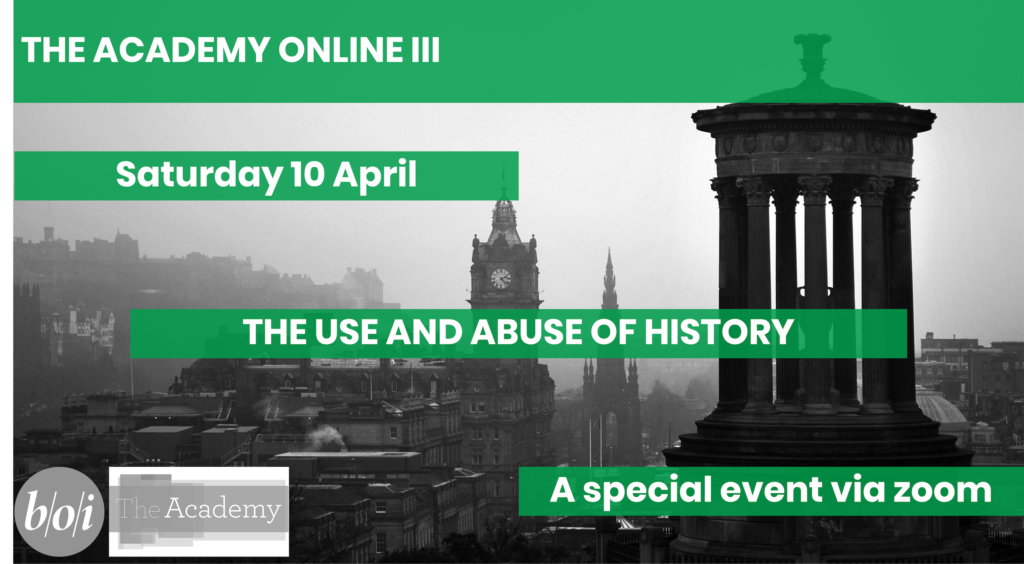
Saturday 10 April 2021
The Academy is Ideas Matter’s annual, residential event where people from all walks of life gather together to cultivate themselves with lectures and seminars, based around good books, and in good company. While the regular, collegiate atmosphere of The Academy has not been possible over the past year, we’ve taken the spirit and intellectual rigour of the event online. Two Academy Online events took place in June and November of last year. This April, The Academy Online will return to tackle the use and abuse of history, in another special online event via zoom.
Introduction
Our politics is suffused with historical comparisons, and the meaning of key historical events is bitterly contested. Each act of the Brexit saga was the ‘Reichstag fire’ moment. Trumpism was fascism returned from the grave. Lockdown policies are like the Soviet Union, cancel culture is like Stalinism, and identity politics is ‘cultural Marxism’. America’s founding date has been shifted from 1776 to 1619, to coincide with the arrival of slaves, and its present is endlessly compared to the decline and fall of the Roman empire. At the same time, the post-Cold War certainty that we had reached ‘the end of history’ is being increasingly called into question first by the populist upswell of the 2010s, and then by the massive expansion of state activity prompted by the coronavirus pandemic. How do we relate to history today? How can we learn from the past without reducing it to a series of moral parables? When are historical comparisons useful, and when do they obstruct understanding the present? What stands in the way of us seizing the present and making our own history?
Programme: 10 April 2021
10.30 – 10.45
Introduction
10.45 – 12.00
Plenary 1: A War on the Past?
Lecturer: Professor Frank Furedi, sociologist; public intellectual; author, Why Borders Matter
From discussions about reparations to the descendants of slaves to the battles over public monuments, the legacy of the past is bitterly contested in today’s culture wars. Many insist that contemporary societies need to do much more to come to terms with, and atone for, the evils committed in the past. If the past actions of a country – such as military victories, the collection of vast treasures or the foundation or independence of a country – were once the source of national pride, today they are widely seen as a source of shame. How did our relationship to the past become so fraught? What are the consequences of this widespread estrangement from the past? If it is no longer possible to see the past as a reservoir of achievements and positive values, by what is the present to be guided? Is there a barely-concealed war on the past, or are societies merely finally facing up to their history?
12.30 – 13.45
Lecture Choices
Choice A. Critique or conspiracy: what was the Frankfurt School?
Lecturer: Dr Tim Black, books and essays editor, Spiked
The term ‘cultural Marxism’ receives wide attention in contemporary discussions. Many insist that it explains a genuine shift in left-wing thought from a materialist focus on economic transformation to a concern for cultural issues and identity politics. Many others dismiss it as an anti-Semitic conspiracy theory with its origins in Nazi attacks on ‘cultural Bolshevism’. Nonetheless, many agree that the Frankfurt School – the term given to a clique of mainly German and Jewish émigré intellectuals such as Theodor Adorno and Herbert Marcuse – did indeed launch a distinctive critique of postwar capitalism that put cultural issues front and centre. This session will assess the legacy of those radical critiques. We will ask why Theodor Adorno, perhaps the most eminent member of the school, ended up comparing the student protestors of the 1960s to the fascists he fled in Germany.
Choice B. Relic or Spectre: what was Fascism?
Lecturer: Professor Aristotle Kallis, University of Keele
The most common historical comparison in contemporary debates is to fascism. From the pro-trump riot at the Capitol to laws requiring the wearing of masks, every political event is compared to the fascism of Nazi Germany. Undoubtedly, and for good reason, the horrors of the early 20th Century loom large over the political imagination of the West. Many of the world’s major political institutions, from the EU to the UN, believe themselves to exist specifically to avoid the horrors of that period repeating themselves. Lost, however, in these endless historical comparisons is any nuance about what Fascism was, and what it represented. Lost, too, are the different forms fascism took, with the distinction between Nazi fascism and Mussolini’s fascism all but forgotten. By comparing every contemporary event to fascism, many are left unable to explain the real causes and consequences of contemporary debates. This session will put fascism in its historical context, and ask what, if anything, can be learnt from it today.
14.00 – 15.30
Plenary 2: Sin or Freedom: what was the foundation of America?
Lecturers:
Dr Cheryl Hudson, lecturer in US Political History, University of Liverpool
and
Professor Francis Buckley, Foundation Professor, George Mason University; political commentator; author, The Way Back: Restoring the Promise of America
In recent years, the founding ideals of the United States of America have increasingly been called into question. Rather than a nation created as an experiment in democratic self-government and throwing off the shackles of British imperialism, America is seen as a racist creation devoted to the institution of slavery. Indeed, this seems to give expression to an impulse that goes beyond America, where all around the world many countries increasingly view themselves as tainted by a foundational sin, whether it be slavery, empire, colonialism or fascism. Rather than building on the achievements of the past, the task of modern, democratic nations seems to be to atone for their history. This session will assess the contrast between the lofty ideals of the American founding fathers and the ‘original sin’ of slavery. We will assess the degree to which the foundation of America marked a distinctive attempt to take control of history, and what the consequences are for America, and the world, of today’s impulse to tar the past as irredeemably corrupt.
Suggested reading list
The books below will help prepare you to engage with the lectures, and may be referred to in the sessions, but there is no requirement to have read them. Use this list to whet your appetite for the day, or return to it afterwards to explore some of the themes raised.

Support the boi charity by buying from Amazon Smile
If you purchase from Amazon already, just click on this link so you can buy from Amazon Smile. We’ll get a small proportion of every purchase you make. Get your books through Amazon Smile and support the boi charity!
Theodor Adorno and Max Horkheimer, Dialectic of Enlightenment
Isaiah Berlin, The Hedgehog and the Fox: An Essay on Tolstoy’s View of History
FH Buckley, American Secession: The Looming Threat of a National Breakup
EH Carr, What is History
Frank Furedi, Mythical Past, Elusive Future
Aristotle Kallis, Fascist Ideology: Territory and Expansionism in Italy and Germany, 1922-1945
Edmund Morgan, American Slavery, American Freedom
Kevin Passmore, Fascism: A Very Short Introduction
Simon Schama, Rough Crossings: Britain, The Slaves, and the American Revolution
Leon Trotsky, Fascism: What it is and how to fight it
Various Authors from the New York Times, The 1619 Project

